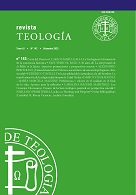Preferences and Values in End-of-life care. Contributions for Reflection
DOI:
https://doi.org/10.46553/teo.60.142.2023.p159-183Keywords:
Values; Preferences; End-of-life Care; Survey; Palliative; CultureAbstract
This work presents a survey and study conducted by the Research Group of the Faculty of Theology at UCA, which focuses on end-of-life spirituality practices. We carried out a nationwide survey in which we collected preferences and values regarding end-of-life care in the face of a hypothetical illness threatening one's well-being. Simultaneously, we considered some key sociodemographic variables with the aim of correlating respondents' answers with the specific characteristics of each surveyed population. After providing context for the work and outlining the methodology used, we present the overall survey results and delve into particular topics, reflecting on them. In the conclusion, we discuss the limitations and possibilities of this research.
Downloads
References
Benito, Enric, Javier Barbero, Mónica Dones, eds. Espiritualidad en Clínica. Una propuesta de Evaluación y Acompañamiento Espiritual en Cuidados Paliativos. Buenos Aires: Ed Biblos-Instituto Pallium Latinoamérica, 2015.
Broom, Anthony. Dying: a social perspective on the end of life. Surrey: Ashgate, 2015.
Byock, Ira. Dying Well: Peace and Possibilities at the End of Life. New York: Riverhead Books, 1997.
Clarke, Amanda y Seymour, Jonathan. «‘At the foot of a very long ladder’: discussing the end of life with older people and informal caregivers», Journal of Pain and Symptom Management 40/6 (2010): 857-869.
Eneslätt, María, Karin Helgesson y Catharina Tishelman. «Exploring Community-Dwelling Older Adults Considerations About Values and Preferences for Future End-of-Life Care: A Study from Sweden». En The Gerontologist XX (2020):1-11.
Galiana, Laura et al. «Cuestionarios de atención espiritual en cuidados paliativos: revisión de la evidencia para su aplicación clínica». Psicooncología 13 num. 2-3 (2016): 385-397.
Glaser, Barney y Anselm Strauss. Awareness of Dying. Chicago: Aldine, 1965.
Glaser, Barney y Anselm Strauss. Time for Dying. Chicago: Aldine, 1968.
Glennon, Catherine et al. «Educating Healthcare employees about Advance Care Planning». eAsia Pac J Oncol Nurs. 6 (2019): 343-348.
Howard, Michelle et al. «Advance care planning. Let’s start sooner». Canadian Family Physician Vol 61 (2015): 663-665.
Howard, Michelle et al «Older patient engagement in advance care planning in Canadian primary care practices». Canadian Family Physician Vol. 64 (2018): 371-377.
Jimenez, Gabriela et al. «Overview of systematic reviews of advance care planning: summary of evidence and global lessons». Journal of Pain and Symptom Management 56(3) (2018): 436-459.
Kessler, David. The Needs of the Dying: A Guide for Bringing Hope, Comfort, and Love to Life's Final Chapter. New York: Harper One, 2007.
Lankarani-Fard, Ali, et al. «Feasibility of discussing end-of-life care goals with inpatient using a structured, conversational approach: the GoWish Card game», Journal of Pain and Symptom Management 39(4) (2010): 637-643.
Lawton, Robert J. The dying process: patient's experiences of palliative care. Londres: Routledge, 2000.
Mazzini, María Marcela. «Prácticas de espiritualidad según Elizabeth Liebert. Aproximación a su pensamiento y ejemplificación en un estudio de caso». Franciscanum. Revista de las ciencias del espíritu 169 vol. 60 (2018): 239-271.
Melloni Ribas, Xavier. «La Espiritualidad como Universal Humano». En Espiritualidad en Clínica. Una propuesta de Evaluación y Acompañamiento Espiritual en Cuidados Paliativos. Benito, Enric, Javier Barbero y Mónica Dones eds. Buenos Aires: Biblos-Instituto Pallium Latinoamérica, 2015.
Meneze, Regina. Em busca da boa morte: antropologia dos Cuidados Paliativos. Rio de Janeiro: Editora Fiocruz, 2004.
Nolan, Steve. Spirituality in Hospice Palliative Care. Oxford: Oxford University Press, 2013.
Olsson Möller, Ulrika et al. «Using cards to facilitate conversations about wishes and priorities of patients in palliative care». Journal of hospice and palliative nursing 22(1) (2020): 33-39.
Radosta, Darío Iván. «Muerte social y terminalidad terapéutica en el marco del moderno movimiento hospice». Mitológicas vol. XXXI (2016): 41-53.
Saunders, Cicely. Velad Conmigo. Inspiración para una vida en Cuidados Paliativos. Madrid: Fundación la Caixa, 2011.
Steinhauser, Karen et al. «Factors considered important at the end of life by patients, Family, physicians and other care providers». JAMA. 284(19) (2000): 2476-2482.
Sternbach, Robert. A. «Dolor». En Wolfgang, Arnold, Hans J. Eysenck, Rudolf Meili (dirs.). Diccionario de Psicología. Madrid, 1979. T I. 358-359.
Sudnow, David. La organización social de la muerte. Buenos Aires: Tiempo Contemporáneo, 1971.
True, Gala et al. «Treatment Preferences and advance care planning at end of life: the role of ethnicity and spiritual coping in cancer patients» Ann Behav Med. 30(2) (2005):174-179.
Vallarino, José María. Los Enfermos, epifanías del Misterio Pascual. Función terapéutica del asistente espiritual. Buenos Aires: Ágape, 2014.
Van Scoy, Lauren. et al. «Community game day: using an end-of-life conversation game to encourage advance care planning». Journal of Pain and Symptom Management 54(5) (2017): 680-691.
Villavicencio-Chávez, Christian et al. «Exploración de los valores y deseos de pacientes con enfermedad crónica avanzada y con enfermedad crónica compleja. Conversaciones acerca del final de la vida». Medicina Paliativa 26(1) (2019): 43-49.
Zwakman, M. et al «Advance care planning: a systematic review about experiences of patients with life-threatening or life-limiting illness». Palliative Medicine. 32(8) (2018): 1305-1321.
Downloads
Published
How to Cite
Issue
Section
License
Copyright (c) 2023 Dario Ivan Radosta , María Marcela Mazini

This work is licensed under a Creative Commons Attribution-NonCommercial-ShareAlike 4.0 International License.


















 Teología
Teología